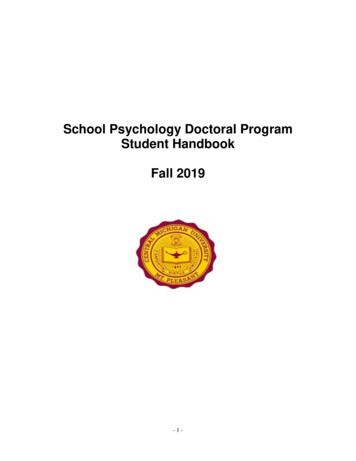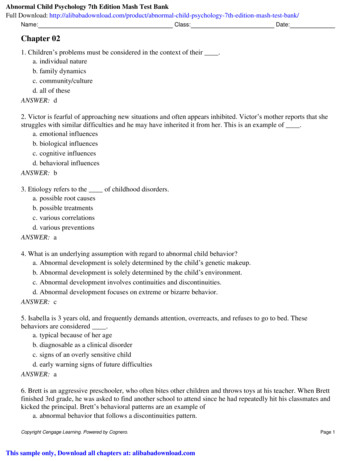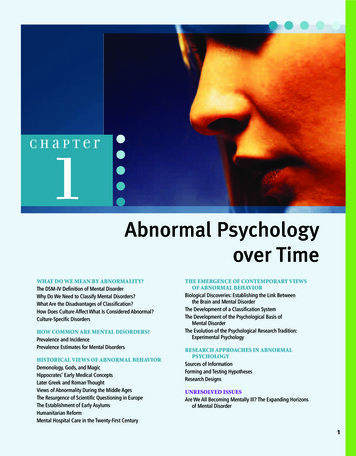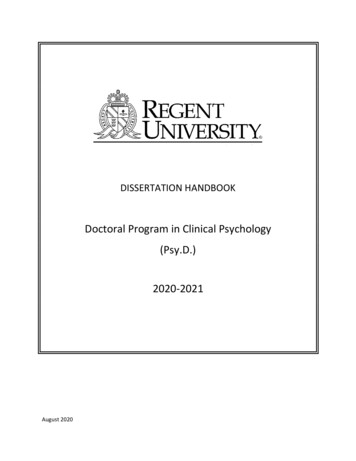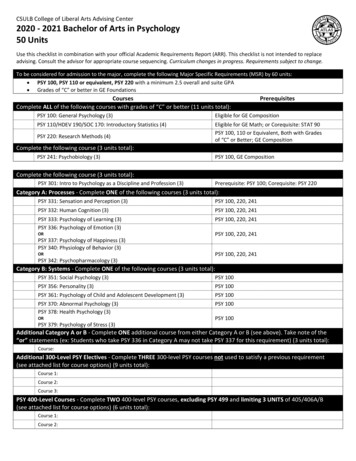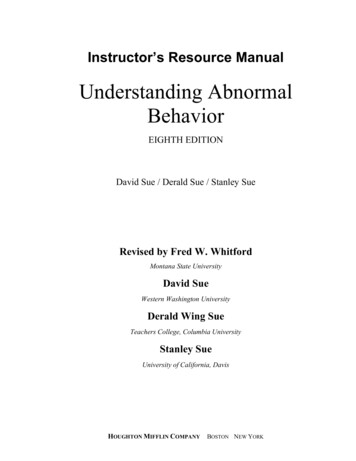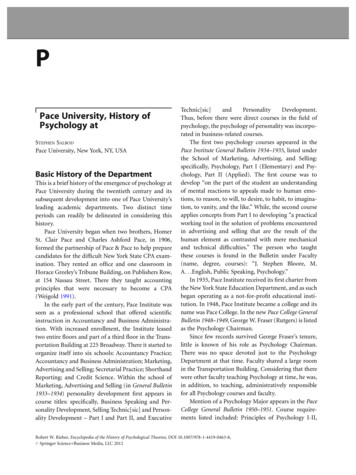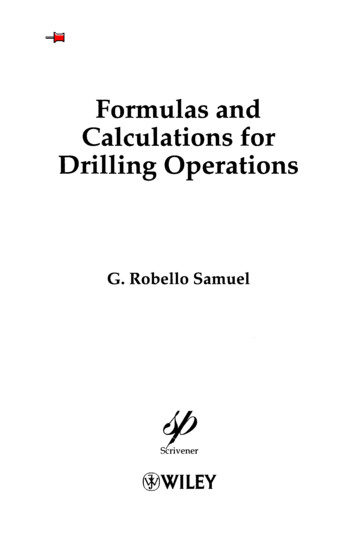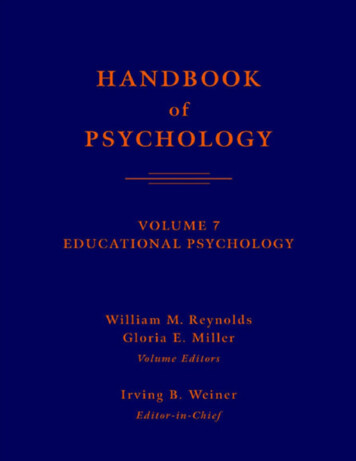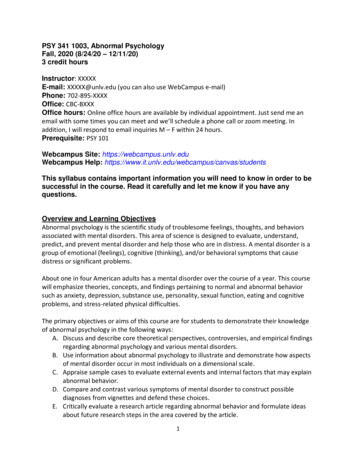
Transcription
PSY 341 1003, Abnormal PsychologyFall, 2020 (8/24/20 – 12/11/20)3 credit hoursInstructor: XXXXXE-mail: XXXXX@unlv.edu (you can also use WebCampus e-mail)Phone: 702-895-XXXXOffice: CBC-BXXXOffice hours: Online office hours are available by individual appointment. Just send me anemail with some times you can meet and we’ll schedule a phone call or zoom meeting. Inaddition, I will respond to email inquiries M – F within 24 hours.Prerequisite: PSY 101Webcampus Site: https://webcampus.unlv.eduWebcampus Help: his syllabus contains important information you will need to know in order to besuccessful in the course. Read it carefully and let me know if you have anyquestions.Overview and Learning ObjectivesAbnormal psychology is the scientific study of troublesome feelings, thoughts, and behaviorsassociated with mental disorders. This area of science is designed to evaluate, understand,predict, and prevent mental disorder and help those who are in distress. A mental disorder is agroup of emotional (feelings), cognitive (thinking), and/or behavioral symptoms that causedistress or significant problems.About one in four American adults has a mental disorder over the course of a year. This coursewill emphasize theories, concepts, and findings pertaining to normal and abnormal behaviorsuch as anxiety, depression, substance use, personality, sexual function, eating and cognitiveproblems, and stress-related physical difficulties.The primary objectives or aims of this course are for students to demonstrate their knowledgeof abnormal psychology in the following ways:A. Discuss and describe core theoretical perspectives, controversies, and empirical findingsregarding abnormal psychology and various mental disorders.B. Use information about abnormal psychology to illustrate and demonstrate how aspectsof mental disorder occur in most individuals on a dimensional scale.C. Appraise sample cases to evaluate external events and internal factors that may explainabnormal behavior.D. Compare and contrast various symptoms of mental disorder to construct possiblediagnoses from vignettes and defend these choices.E. Critically evaluate a research article regarding abnormal behavior and formulate ideasabout future research steps in the area covered by the article.1
Course MaterialsTextbook: Kearney, C.A., & Trull, T.J. (2017). Abnormal psychology and life: Adimensional approach (3rd edition). Belmont, CA: Cengage/Wadsworth.Online content: E-book, videos, quizzes, individual assignmentYou can purchase the course materials at the book store or using this -and-life-a-dimensional-approach3ekearney/If you buy online, you have a number of options (e-book, hard copy, bundle). Whichever optionyou pick, you will need a copy of the textbook at a minimum (either hard copy or e-copy). Thebook is the only resource you need to purchase for this course. If you need a course key topurchase materials for the course on the Cengage website, use the following information:Course Link URL: e Link Instructions: Print instructionsCourse Key: MTPN-38BQ-ZCGJCourse Requirements and General InformationThis course involves text reading, viewing video lectures and video cases and other material,participating in online discussions, completing an individual writing project, and taking quizzes.You will be expected to: Have ready access to the Internet with a reliable connection of sufficient bandwidth toview online videos (public WiFi systems are not reliable or recommended, i.e., do nottake your tests at a coffee shop because you may get logged off) Read and view all content provided by the instructor Participate fully in discussions Complete assignments/quizzes Login to course at least 5 times/week (greater frequency strongly recommended)To access video lectures, make sure that you have an updated version of RealPlayer. Canvas iscompatible with all browsers so if you have trouble accessing the course, the IT Help Desk canhelp. You can call the Help Desk at (702) 895-0777, 7 AM – 11 PM daily (including weekendsand holidays) or send them an email at ithelp@unlv.edu.Course Modules (This course will be organized according to the following modules):Module 1: Introduction to Abnormal Psychology (Chapters 1-4 of the textbook)2
This module introduces basic concepts of abnormal psychology that set the stage for discussionof mental disorders in subsequent chapters. Chapter 1 covers how to define abnormal behaviorand a mental disorder, including deviance from the norm, difficulties adapting to life demands,and experience of personal distress. History of abnormal psychology is covered as is a keytheme of the textbook, the dimensional approach to understanding mental disorders (i.e.,seeing mental disorders as an extension of symptoms or traits seen in everyone and not acompletely different set of behaviors). Chapter 2 covers different models used to explain thecauses of mental disorders, including biological (genetics, neurochemistry, and structural brainchanges), psychodynamic/Freudian, humanistic, cognitive-behavioral, and sociocultural models.Chapter 3 covers risk factors and prevention of mental disorders, including discussions of adiathesis-stress model that integrates perspectives from Chapter 2. Epidemiology, or theprevalence of major mental disorders, is included as well. Chapter 4 covers how mentaldisorders are currently defined, classified, and assessed. Research strategies to study mentaldisorder are also covered.Module 1 Assignments: August 24 - September 18August 26 - Sept. 9 Participate in Introduction / Discussion 1 due by Noon 9/9August 24 – 28Read Chapter 1, View Video Lecture 1August 31 - Sept. 3 Read Chapter 2, View Video Lecture 2September 4Complete QUIZ 1 (Chapters 1 & 2)September 7 – 11Read Chapter 3, View Video Lecture 3September 14 – 17 Read Chapter 4, View Video Lecture 4September 18Complete QUIZ 2 (Chapters 3 & 4)*December 2 Individual Writing Assignment Due by NOON PT 12/2/20Module 2: Mood-based Disorders (Chapters 5-8 of the textbook)This module introduces mental disorders that often involve an emotional or mood-basedcomponent. All chapters include information on normal and abnormal behavior, features, andepidemiology of the pertinent mental disorders, risk factors, prevention, assessment,treatment, and long-term outcome. Chapter 5 covers anxiety-related disorders such as panicdisorder and agoraphobia, social and specific phobias, obsessive-compulsive and generalizedanxiety disorder, and posttraumatic stress disorder. Chapter 6 covers somatic symptomdisorders, or those disorders involving odd physical problems and distress. These includesomatic symptom, illness anxiety, and conversion disorders. Chapter 6 also covers dissociativedisorders, or those disorders involving disturbance of consciousness, memory, or identity.These include amnesia, dissociative identity (multiple personality) disorder, anddepersonalization/derealization. Chapter 7 covers major mood disorders related to depressionand bipolar disorder as well as suicide. Chapter 8 covers eating disorders such as anorexia andbulimia nervosa; these disorders are often linked to anxiety and depression.Module 2 Assignments: September 21 - October 163
Sept. 23 - Oct. 7September 21 – 24September 25Sept. 28 - Oct. 2October 5 - 8October 9October 12 - 15October 16Participate in Discussion 2 due by Noon 10/7Read Chapter 5, View Video Lecture 5Complete QUIZ 3 (Chapter 5)Read Chapter 6, View Video Lecture 6Read Chapter 8, View Video Lecture 8Complete QUIZ 4 (Chapter 6 & 8)Read Chapter 7, View Video Lecture 7Complete QUIZ 5 (Chapter 7)*December 2 Individual Writing Assignment Due by NOON PT 12/2/20Module 3: Intense Disorders (Chapters 9-11 of the textbook)This module discusses more intense disorders. Chapters include information on normal andabnormal behavior, features and epidemiology of pertinent mental disorders, risk factors,prevention, assessment, treatment, and long-term outcome. Chapter 9 covers substancerelated disorders and includes an in-depth look at alcohol and other excessive drug use,especially among college students. Chapter 10 covers the many different personality disorders,which are marked by the presence of odd or unusual personality traits. Personality disordersinclude those marked by odd or eccentric behavior, dramatic or irrational behavior, and anxiousor fearful behavior. Chapter 11 covers deviant sexual practices that may become the basis for amental disorder and problems that arise during the normal sexual process, such as erection orlubrication difficulties.Module 3 Assignments: October 19 - November 6October 21 - Nov. 4 Participate in Discussion 3 due by Noon 11/4October 19 - 22Read Chapter 9, View Video Lecture 9October 23Complete QUIZ 6 (Chapter 9)October 26 - 30Read Chapter 10, View Video Lecture 10November 2 - 5Read Chapter 11, View Video Lecture 11November 6Complete QUIZ 7 (Chapters 10 & 11)*November 2 Last day to drop or withdraw from classes this semester*December 2 Individual Writing Assignment Due by NOON PT 12/2/20Module 4: Severe Disorders (Chapters 12-14 of the textbook)This module covers some of the most severe disorders. All chapters include information onnormal and abnormal behavior, features and epidemiology of the pertinent mental disorders,risk factors, prevention, assessment, treatment, and long-term outcome. Chapter 12 coverspsychotic disorders, which involve a gross disturbance in the way one relates to reality. Thischapter includes a discussion of schizophrenia and its various forms as well as types ofdelusions. Chapter 13 covers largely child-based disorders. Developmental disorders includethose involving delayed development, such as intellectual disability and autism. Disruptive4
behavior disorders include those involving problematic behavior and include oppositionaldefiant and conduct disorder as well as attention deficit hyperactivity disorder. Chapter 14covers neurocognitive disorders that primarily occur in older adults, such as delirium,Alzheimer's disease, vascular disease, and Parkinson's disease.Module 4 Assignments: November 9 - November 27November 11 - 25Participate in Discussion 4 due by Noon 11/25November 9 - 12Read Chapter 12, View Video Lecture 12November 13Complete QUIZ 8 (Chapter 12)November 16 - 20Read Chapter 13, View Video Lecture 13November 23 - 26Read Chapter 14, View Video Lecture 14November 27Complete QUIZ 9 (Chapters 13 & 14)*December 2 Individual Writing Assignment Due by NOON PT 12/2/20Module 5: A consumer approach to abnormal psychology (Chapter 15 and Appendix)This brief module represents an introduction to a consumer approach regarding abnormalpsychology. Chapter 15 covers information about how to become a mental health professional,concepts to consider when seeking mental health services, specific aspects of treatment andwhy treatment works, community-based treatments such as support groups and aftercareservices, and limitations regarding treatment. The chapter also includes a discussion of keyethical concepts related to abnormal psychology, including confidentiality, consent, and sexualintimacy with clients. Stress-related physical disorders are covered in this module as well.Module 5 Assignments: November 28 - December 11Nov. 28 - Dec. 6Participate in Discussion 5 due by Noon PT 12/6December 2Individual Writing Assignment Due by NOON PT 12/2/20Nov. 30 - Dec. 6Read Chapter 15 and Appendix, View Video Lecture 15December 7Complete FINAL QUIZ 10 (Chapter 15 & Appendix)EvaluationYour grade for this course will be based on your completion of Discussions, an IndividualWriting Assignment, and Quizzes. The following sections provide detailed descriptions of theseactivities. Please read these sections carefully and let me know if you have any questions.Discussions (25% of final grade)Students must fully, actively, and frequently participate in the discussions throughout the timeperiod when discussions are available, and all posts are due NOON PST (12PM) on theassigned due date. Contributions to discussions will be graded based on frequency of postingsand according to the following. High-quality contributions to discussions are necessary andexpected. Contributions that are limited in scope, subject matter, quantity, or quality will notbe considered and/or not be graded highly. Contributions that are limited to a small timeframe5
(e.g., one evening or morning or day) will not be graded highly. Your discussion posts shouldhelp move the discussion forward. For example, indicating that you agree with anotherstudent’s post does not move the discussion forward and so will not receive a high grade.Indicating in your post that you agree and then including some of your own unique thoughtsand perspectives on the topic will move the discussion forward and so will receive a highergrade. Contributions to discussions will be graded according to these criteria as well as thequality of the posts.To complete some of the discussions, you will need to access MindTap through Cengage.Links to the videos are provided in the learning modules for the course. After your initial posts,read and respond to at least 5 others whose posts you find interesting, insightful, or representan opinion different from your own. Make sure to sign in at least 5 days to read and respond toothers posts.The discussions will contribute 25% to your final grade (18 points each).Individual Writing Assignment (25% of final grade)An individual writing assignment is required for this course and is due by noon PT December2, 2020. This is a 4-page paper (double-spaced, 1-inch margins, Times New Roman, 12-pointfont, APA style) on a research article published in 2019-2020 in one of the following journals:(1) Journal of Abnormal Psychology, (2) Behavior Therapy, or (3) Journal of Consulting andClinical Psychology. You must select an article from one of these three journals. Papersthat are not based on articles from one of these three journals will be penalizedone letter grade prior to grading.Also, the article you select must be a research article, i.e., it must report the results of aresearch study. One way to identify research articles is by the sections they include. There willbe Introduction, Method, Results, and Discussion sections, along with a Reference section atthe end of the article. Please contact me if you have any questions about whether the articleyou select is a research article. Papers based on articles that are not research articles(e.g., reviews of the literature, position papers, commentaries) will be penalizedone letter grade.All of these journals are available in the UNLV library and can be accessed online rimoexplore/jsearch?vid UNLV&lang en USAs a student enrolled in this class you have access to the online library resources at UNLV. If youhave not accessed the online resources before and would like to do so, you may need tocontact the library to find out how you can obtain online access. You can contact the UNLVlibrary at (702) 895-2111. Please do this immediately so that you can begin to complete yourpaper for the course.6
Papers must be 4 pages. The first two pages need to contain a summary, in your ownwords (watch out for plagiarism), of the article's:1. Purpose2. Methodology3. Results4. Main conclusionsThe second two pages must represent your critique of the article that includes the following:1. Your general opinion of the quality of the article2. A critique of the article's methodology (including major flaws or drawbacks)3. A future study you would conduct in this area based on the findings in the article (i.e.,what would be the next logical step in research based on the article findings).Papers will be graded according to quality of the summary and critique and full justification ofarguments made. Headings are strongly recommended within the paper that show you haveaddressed all the areas mentioned. In addition to these four pages, include a title page and areference page. The title page should include your name, the title of your paper, and a runninghead. The reference page should include the citation to the article you are summarizing (in APAformat) as well as any other sources you used to complete your paper.The title page and reference page do not count toward the 4 page limit. Some other importantpoints for the paper include: First, while the paper is to be written in APA format, an Abstract is NOT required. TheAbstract is a 250 word summary of the paper that is included in a research or otherarticle that appears in a journal. Since you are not writing a journal article, an Abstract isNOT required.Second, the title of your paper can be most anything you’d like as long as it is relevant tothe article. You could have a title like this: “A Critical Review of [Article Name]”, butwhatever you decide is fine with me.Third, the reference section of your paper must include the full reference to the articleyou are reviewing. This reference should be in APA format. You can include otherreferences as well, if you use them in your critique of the article. These could be otherarticles, online sources, etc., and you should use APA format for each of these differentkinds of references.Fourth, you need to include a Running Head on the title page of your paper and in theheader for each page in your paper. The Running Head is a brief title (40 characters orless). The Running Head should conform to APA style.If you are unfamiliar with APA style, here is a link to helpful online resources thatprovide summaries of the style components: http://www.apastyle.org/Your paper is worth 90 points and will contribute 25% to your final grade.Quizzes (50% of final grade)7
The date by which each quiz must be completed is listed in the Course Schedule and calendar.There will be 10 quizzes. Quizzes will consist of 20 multiple-choice questions that must becompleted within 30 minutes of starting the quiz. Quizzes will be administered over theinternet. Each quiz will be available the day it is due, beginning at 1:00 AM, and must becompleted by 11:59 PM that day (see Course Schedule). Students’ scores for each quiz will bereleased immediately after the quiz is due.Late quizzes will not be accepted. You can only access the quiz once and there is a 30-minutetime limit for the quiz once you start, so be sure to pick a time to take the quiz during whichyou will not be interrupted. If you are inadvertently logged off during the quiz, you will not beable to re-enter the quiz to complete it, so make sure you have reliable internet access(ethernet connection preferred). Public WiFi is NOT reliable, so do not take quizzes using apublic WiFi connection, like at a coffee shop.Your lowest quiz score will be dropped from your course grade in order to allow for a missedquiz due to computer/internet difficulties or ANY other reason (e.g., illness, familycommitments, work obligations, vacations, etc.). No make-up quizzes will be given so it iscritical that you are familiar with using WebCampus before you take the first quiz. The courseinstructor reserves the right to insist that any student take proctored quizzes or retake any quizif cheating is suspected.Do not ask a question or make a comment about the quizzes using the discussion page.Send any questions to me via WebCampus email.Quizzes are worth 20 points each and will contribute 50% to your final grade.Grading ScaleYour course grade will be based on the total points possible from modulediscussions/participation (18 points per module 90 points total), individual writing assignment(90 points), and quizzes (9 quizzes at 20 points each 180 points).Course Grades will be based on the following scale:93% – 100% A73% – 76% C90% – 92% A70% – 72% C87% – 89% B 67% – 69% D 83% – 86% B63% – 66% D80% – 82% B60% – 62% D77% – 79% C below 60% FCourse PoliciesAssignments and Quizzes – Students will be penalized one letter grade per day for latewriting assignments, including papers submitted after the noon PT deadline on the due date.Writing assignments that are not completed will be scored as “zero.” No extra credit8
assignments will be given. Quizzes must be taken on the date assigned; no alternative quizzeswill be provided. If no discussion posts are provided by the deadline for a particular module, ascore of “zero” will be entered.Course ScheduleThis schedule summarizes due dates for activities required for this course. Due datescorrespond to those listed in the above sections describing Modules 1 - 5.Complete readings, quizzes, and discussions, by dates below. Quizzes are available beginningat 1:00 AM on the date they are due and must be completed by 11:59 PM on the due date.Discussions are due at Noon PT on assigned dates.Module 1 Assignments: August 24 - September 18August 26 - Sept. 9Participate in Introduction/Discussion 1 due by Noon 9/9August 24 - 28Read Chapter 1, View Video Lecture 1August 31 - Sept 3Read Chapter 2, View Video Lecture 2September 4Complete QUIZ 1 (Chapters 1 & 2)September 7 - 11Read Chapter 3, View Video Lecture 3September 14 - 17Read Chapter 4, View Video Lecture 4September 18Complete QUIZ 2 (Chapters 3 & 4)*December 2 Individual Writing Assignment Due by NOON PT 12/2/20Module 2 Assignments: September 21 - October 16Sept. 23 - Oct. 7Participate in Discussion 2 due by Noon 10/7Sept. 21 - 24Read Chapter 5, View Video Lecture 5September 25Complete QUIZ 3 (Chapter 5)Sept. 28 - Oct. 2Read Chapter 6, View Video Lecture 6October 5 - 8Read Chapter 8, View Video Lecture 8October 9Complete QUIZ 4 (Chapter 6 & 8)October 12 - 15Read Chapter 7, View Video Lecture 7October 16Complete QUIZ 5 (Chapter 7)*December 2 Individual Writing Assignment Due by NOON PT 12/2/20Module 3: October 19 - November 6October 21 - Nov. 4Participate in Discussion 3 due by Noon 11/4October 19 - 22Read Chapter 9, View Video Lecture 9October 23Complete QUIZ 6 (Chapter 9)October 26 - 30Read Chapter 10, View Video Lecture 10November 2 - 5Read Chapter 10, View Video Lecture 10November 6Complete QUIZ 7 (Chapters 10 & 11)*November 2 Last day to drop classes this semester*December 2 Individual Writing Assignment Due by NOON PT 12/2/20Module 4: November 9 - November 279
November 11 - 25Participate in Discussion 4 due by Noon 11/25November 9 - 12Read Chapter 12, View Video Lecture 12November 13Complete QUIZ 8 (Chapters 12 & 13)November 16 - 20Read Chapter 13, View Video Lecture 13November 23 - 26Read Chapter 14, View Video Lecture 14November 27Complete QUIZ 9 (Chapters 13 & 14)*December 2 Individual Writing Assignment Due by NOON PT 12/2/20Module 5: November 28 - December 11November 28 - Dec. 6Participate in Discussion 5 due by Noon PT 12/6December 2Individual Writing Assignment Due by NOON PT 12/2/20November 30 - Dec. 6Read Chapter 15 and Appendix, View Video Lecture 15December 7Complete FINAL QUIZ 10 (Chapter 15 & Appendix)University Resources and PoliciesPublic Health DirectivesFace coverings are mandatory for all faculty and students in the classroom. Students mustfollow all active UNLV public health directives while enrolled in this class. UNLV public healthdirectives are found at ts. Students whodo not comply with these directives may be asked to leave the classroom. Refusal to follow theguidelines may result in further disciplinary action according to the UNLV Code of StudentConduct, https://www.unlv.edu/sites/default/files/page files/27/StudentConduct-Code.pdf,including being administratively withdrawn from the course.Academic MisconductAcademic integrity is a legitimate concern for every member of the University community. Weall share in upholding the fundamental values of honesty, trust, respect, fairness, responsibility,and professionalism. By choosing to join the UNLV community, students accept theexpectations of the Student Academic Misconduct Policy, and are encouraged to always takethe ethical path whenever faced with choices. Students enrolling at UNLV assume theobligation to conduct themselves in a manner compatible with UNLV’s educational mission. Anexample of academic misconduct is plagiarism. Plagiarism is using the words or ideas of anotherperson, from the Internet or any other source without proper citation of the source(s). See theStudent Conduct Code, t.Auditing ClassesAuditing a course allows a student to continue attending the lectures and/or laboratories anddiscussion sessions associated with the course, but the student will not earn a grade for anycomponent of the course. Students who audit a course receive the same educationalexperience as students taking the course for a grade, but will be excused from exams,assessments, and other evaluative measures that serve the primary purpose of assigning a10
grade.Classroom ConductStudents have a responsibility to conduct themselves in class and in the libraries in ways that donot interfere with the rights of other students to learn, or of instructors to teach. Use ofelectronic devices such as pagers, cellular phones, or recording devices, or potentiallydisruptive devices or activities are only permitted with the prior explicit consent of theinstructor. The instructor may rescind permission at any time during the class. If a student doesnot comply with established requirements or obstructs the functioning of the class, theinstructor may initiate an administrative withdrawal of the student from the course.CopyrightThe University requires all members of the University Community to familiarize themselveswith, and to follow copyright and fair use requirements. You are individually and solelyresponsible for violations of copyright and fair use laws. The University will neither protect nordefend you, nor assume any responsibility for employee or student violations of fair use laws.Violations of copyright laws could subject you to federal and state civil penalties and criminalliability, as well as disciplinary action under University policies. Additional copyright policyinformation is available at https://www.unlv.edu/provost/copyright.Disability Resource Center (DRC)The UNLV Disability Resource Center (SSC-A, Room 143, https://www.unlv.edu/drc, telephone702-895- 0866) provides resources for students with disabilities. Students who believe that theymay need academic Office of the Executive Vice President and Provost Box 451002 4505South Maryland Parkway Las Vegas, Nevada 89154-1002 (702) 895-3301 FAX (702) 8954054 http://www.unlv.edu/provost 2 accommodations due to injury, disability, or due topregnancy should contact the DRC as early as possible in the academic term. A DisabilitiesSpecialist will discuss what options may be available to you. If you are registered with the UNLVDisability Resource Center, bring your Academic Accommodation Plan from the DRC to theinstructor during office hours, so that you may work together to develop strategies forimplementing the accommodations to meet both your needs and the requirements of thecourse. Any information you provide is private and will be treated as such. To maintain theconfidentiality of your request, please do not approach the instructor in front of others todiscuss your accommodation needs.Final ExaminationsThe University requires that final exams given at the end of a course occur on the date and atthe time specified in the Final Exam schedule. The Final Exam schedule is typically available atthe start of the semester, and the classroom locations are available approximately one monthbefore the end of the semester. See the Final Exam Identity Verification in Online CoursesAll UNLV students must use their Campus-issued ACE ID and password to log in to WebCampus11
Canvas. UNLV students enrolled in online or hybrid courses are expected to read and adhere tothe Student Academic Misconduct uct/policy, which states that “acting orattempting to act as a substitute for another, or using or attempting to use a substitute, in anyacademic evaluation or assignment” is a form of academic misconduct. Intentionally sharingACE login credentials with another person may be considered an attempt to use a substitute,and could result in investigation and sanctions, as outlined in the Student Academic MisconductPolicy.UNLV students enrolled in online courses are also expected to read and adhere to theAcceptable Use of Computing and Information Technology Resources policy, which prohibits sharing university accounts with other persons withoutauthorization.To the greatest extent possible, all graded assignments and assessments in UNLV online coursesshould be hosted in WebCampus-Canvas or another UNLV-managed platform that requires ACElogin credentials for access.Incomplete GradesThe grade of “I” (Incomplete) may be granted when a student has satisfactorily completedthree-fourths of course work for that semester/session, but cannot complete the last part ofthe course for reason(s) beyond the student’s control and acceptable to the instructor, and theinstructor believes that the student can finish the course without repeating it. Forundergraduate courses, the incomplete work must be made up before the end of the followingregular semester. Graduate students receiving “I” grades in 500-, 600-, or 700-level courseshave up to one calendar year to complete the work, at the discretion of the instructor. If courserequirements are not completed within the period indicated, a grade of “F” will be recorded,and the student’s GPA will be adjusted accordingly. Students who are fulfilling an Incomp
1 PSY 341 1003, Abnormal Psychology Fall, 2020 (8/24/20 – 12/11/20) 3 credit hours Instructor: XXXXX E-mail: XXXXX@unlv.edu (you can also use WebCampus e-mail) Phone: 702-895-XXXX Office: CBC-BXXX Office hours: Online office hours are available by individual appointment.Just send me an email with some tim
